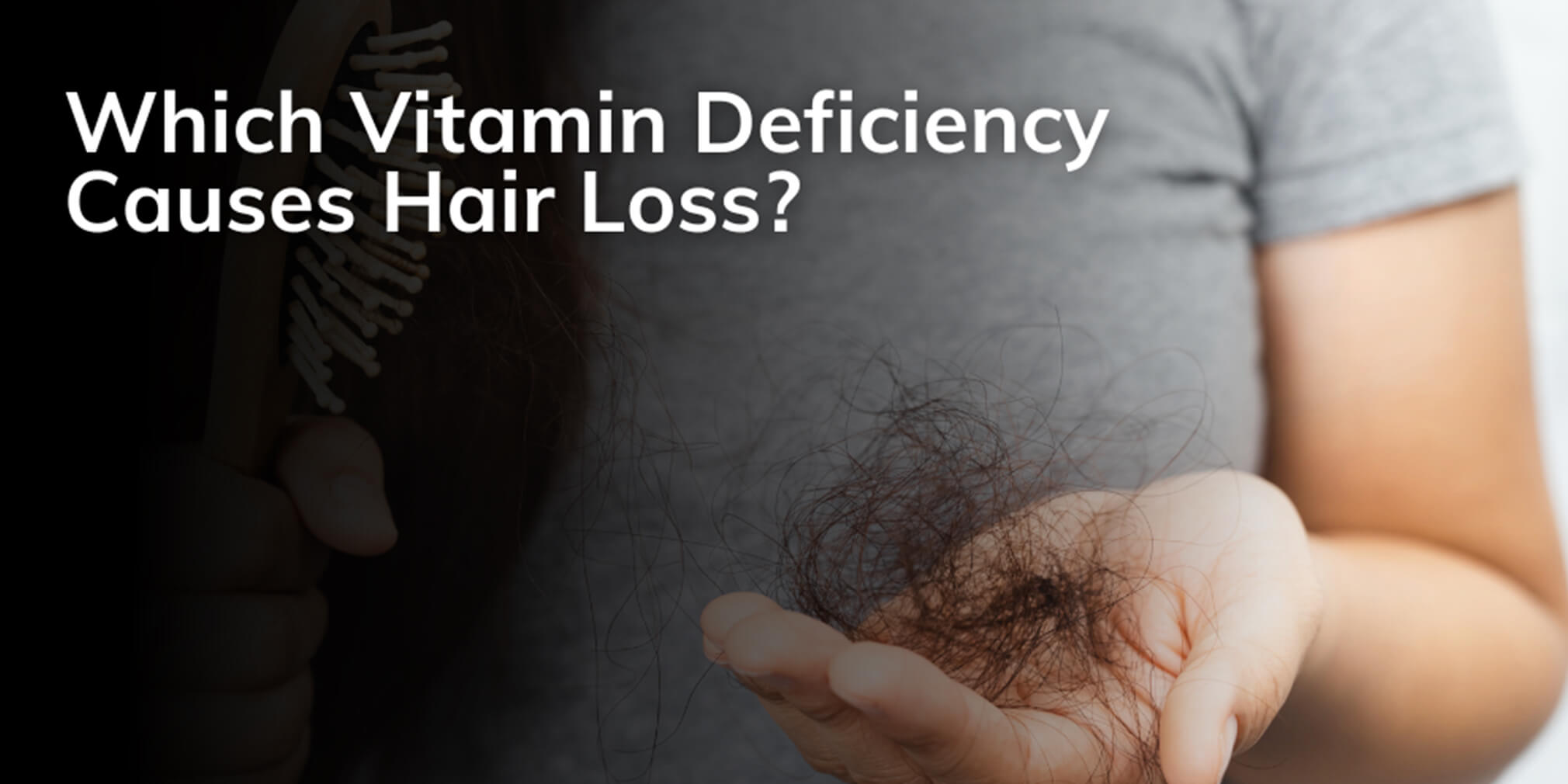
Which Vitamin Deficiency Causes Hair Loss?
Treatments for Vitamin-Related Hair Loss
The sight of more hair on the brush, or elsewhere, is an unsettling concern. People affected by hair fall start looking for answers and solutions to the condition. Hair loss is indeed a common concern with everyone and the following are the understood reasons for it:
- Genetics.
- Hormonal Changes.
- Medical Conditions.
- Nutritional Imbalance.
Nutritional imbalance has usually been referred to as a vitamin deficiency. Like our bodies, human hair also needs a steady supply of essential minerals and vitamins to grow and remain healthy. Lack of such nutrients can disrupt the hair growth cycle. This leads to hair becoming thin and eventually loss of hair.
Understanding the specific deficiencies linked to hair loss is key to addressing the issue. In this article, we will understand the key vitamins that play a key role in maintaining their health and understand which vitamin deficiency causes hair loss. We will also examine the treatment methods to help maintain proper hair health.
Different Kinds of Hair Loss
There are four kinds of hair loss. We will briefly understand them to gain a better understanding of the topic.
- Androgenetic Alopecia: This one is commonly found in balding males and females. It is a kind of hair loss that is genetic and is connected to hormonal imbalance.
- Alopecia Areata: It is an autoimmune disease that causes hair to fall rapidly in patches.
- Telogen Effluvium: This is a reversible condition. Here, hair sheds due to stress, hormones, or an improper eating regimen. It prevents hair formation, causing hair follicles to rest and leading to hair loss.
- Traction Alopecia: This condition is caused by repeatedly wearing the same hairstyle. Continuous tension on the scalp causes breakage and hair loss.
The role minerals and vitamins play in hair health
Both minerals and vitamins are essential for maintaining healthy hair follicles and supporting the hair growth cycle. They help in the production of red blood cells. These cells carry oxygen and nutrients to the hair follicles.
Which vitamin is good for hair? Most of the vitamins are essential and have a link with hair growth. A balanced diet rich in such essential nutrients is key to the prevention of hair loss. In turn, it promotes healthy hair growth. Zinc for hair is proven to be beneficial.
Which vitamin’s deficiency has a strong link to hair loss?
How is Vitamin D Deficiency Linked to Hair Loss?
Vitamin D for hair is very important. Its deficiency is linked to hair loss. The vitamin is a fat-soluble one that plays an important role in the hair growth cycle. It helps create new hair follicles and supports the health of existing ones.
Low levels of vitamin D can lead to hair thinning and alopecia areata in some instances. It is a condition that causes patchy hair loss. Raising the vitamin D intake via fatty fish, sunlight exposure or vitamin D supplements can help in maintaining healthy hair.
Iron Deficiency’s Link to Hair Loss
Iron deficiency (or iron deficiency anemia) is another contributor to hair loss. Iron is important for the production of red blood cells. These cells are essential for delivering oxygen to the hair follicles.
Lack of iron leads to hair becoming thin. It also creates brittle hair and hair loss in severe cases. Consuming iron-rich foods like red meat, spinach, and iron supplements can help combat hair loss caused by iron deficiency.
Impact of Vitamin B12 Deficiency on Hair Loss
Vitamin B12 is essential for healthy hair growth. It helps with the formation of healthy red blood cells and supports the overall health of hair follicles. Deficiency of Vitamin B12 leads to hair thinning, and this adversely affects hair health.
Vegetarians and vegans are often unable to consume B12-rich foods. Incorporating vitamin B12 through a proper diet or supplements is crucial for individuals at risk of deficiency.
Biotin Deficiency and Hair Loss
Also known as Vitamin B7, Biotin is vital for healthy and robust hair. Its deficiency can cause hair to become brittle and thin. Biotin supports the production of keratin. It is a protein that makes up the hair, skin, and nails.
Biotin is found in numerous foods like eggs, nuts, and seeds. Yet its deficiency can take place. It leads to hair loss. Its deficiency can be addressed through dietary changes or supplements that promote hair regrowth and maintain healthy skin.
Folic Acid Deficiency’s Link with Hair Loss
Folic acid is also known as Vitamin B9. It is important for the synthesis of DNA and RNA, which are crucial for rapid cell division happening in the hair follicles. Deficiency of folic acid can affect hair health and cause it to thin. Leafy greens, beans, and fortified cereals are rich in folic acid. They can support healthy hair follicles to help prevent hair loss.
Deficiency of Vitamin C
Vitamin C is essential for the production of collagen. It is a protein that strengthens hair and promotes healthy hair follicles. Its deficiency causes hair to be weak and brittle. It also affects the immune system, making hair more prone to damage.
Moreover, Vitamin C helps the body absorb iron. It makes it crucial for those dealing with iron deficiency anemia. Consuming foods rich in it helps maintain healthy hair, like citrus fruits, berries, and tomatoes.
Treatments for Vitamin-Related Hair Loss
When either vitamin tests for hair loss or a blood test for hair loss can confirm a certain deficiency causing hair loss, the treatments will focus on restoring nutrient levels and supporting healthy hair growth.
Improving the Diet
A diet rich in nutrients is essential for long-term hair health. Focusing on whole foods such as lean red meat, lentils, fatty fish, leafy greens, eggs, dairy, nuts, and seeds. These foods provide fundamental nutrients like iron, vitamin D, vitamin B12, biotin, and zinc.
Please do not go for crash diets or extreme restrictions, as they often lack these nutrients. They can hence trigger hair loss.
Taking Supplements Recommended by Doctors
Take supplements only on a doctor’s advice and once deficiencies have been confirmed. Doctors can prescribe the following:
- Iron supplements for low ferritin.
- High-dose vitamin D3 if their levels are quite low.
- Vitamin B12 shots are administered if a deficiency is spotted.
Biotin and zinc can also be recommended, but if necessary. Over-supplementing with either iron or vitamin A can cause health issues and worsen hair loss. Always take prescriptions on the doctor’s recommendation.
Topical Treatments
Topical treatments like minoxidil can help support hair regrowth while the body restores its nutrient levels. It works by stimulating follicles and raising the blood flow to the scalp. People can also benefit from shampoos and conditioners rich in peptides that strengthen hair and support hair growth.
Addressing adverse lifestyle factors
Poor sleeping patterns, stress, and overusing heat or chemical treatments can slow down hair health, hair growth and recovery (even if the vitamin levels improve). Stress management, quality sleep, and gentle hair care help support its regrowth.
Over to You
No doubt hair loss is a worrisome condition. It can however be addressed by both natural and medical means. Consulting with a doctor is also a worthwhile option to determine its root cause. A lack of certain vitamins can be the cause and are resolved via a proper medical test. This hence paves the way for a proper treatment to help restore hair health.
